Yesterday morning Yousef Amira, the 17 year old from Ni’lin who was shot twice in the head with rubber coated steel bullets died in the hospital in Ramallah.

Yousef was shot by Israeli soldiers during the funeral of ten year old Ahmad Musa.
Its hard to figure out what to say, its hard to describe what Ni’lin has lost this past week.
Yes, they have lost two young boys, but is that all, is this all they have lost?
It may be the most important thing they have lost, it may be the most precious thing they have lost, but the loss in Ni’lin is so much greater than this. The loss is compounded by the loss of land, the loss of jobs, the loss of freedom, the loss of rights.
In the international community we spend a lot of time talking about rights, we talk about basic human rights, we talk about a rights based approach to development, we talk about securing human rights, about giving dignity to all. We spend a lot of money to be educated about these things, but everything you really need to learn about rights you can learn in Ni’lin.
In Ni’lin, people have lost their rights. They have no right to stand up to say that Israel cannot build a wall on their land. They have no right to stand up and say they refuse to have the only entrance to their village be through an Israeli-controlled tunnel, they have no right to stand up and say they refuse the economic degradation that the wall and the tunnel will impose on them, that they refuse to lose their jobs because they will be unable to get to work, that they refuse to lose a sense of security for their children, their children who they love with all their hearts.
They have lost their rights, and yet they are refusing to accept this loss, they are refusing the Israeli bulldozers that work on their land, refusing the soldiers that occupy their village, that shoot their kids, and over what? Over the loss of their rights.
And for their part, their children refuse to just sit and watch as their future disappears, as their land disappears, as the life that they know, the only life that they know, the life that they love, their life on the land of Ni’lin is taken from them.
They have no right to say anything. They have no right to go to demonstrate, to show the world what they are losing, and now to demonstrate means to risk losing your life.
These rights are worth fighting for, so for all of us who believe in rights, why aren’t we doing more to protect the rights of the people in Ni’lin?
If we believe ourselves to be a part of an international community dedicated to promoting rights, then why aren’t we doing more to protect these rights?
All I know is right now, there is almost no one protecting the rights of the people of Ni’lin.
At Yousef’s funeral procession from Ramallah to Ni’lin the Palestinian Authority closed the road from the hospital in Ramallah to Ni’lin, holding up the funeral procession for 2 hours.
I thought the PA was supposed to help protect the rights of Palestinians, but it appears that in Ni’lin, they don’t even have the right to bury their children.
The PA claimed the roadblock was to prevent Hamas supporters from attending the funeral in Ni’lin, and arrested five people because they were carrying Hamas flags.
But the PA also refused to permit anyone at the roadblock to take pictures or video, and I was harassed by a PA security agent who demanded that I give him my SD card and video tape.
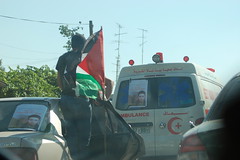
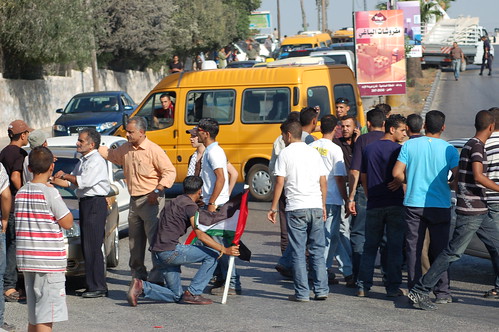

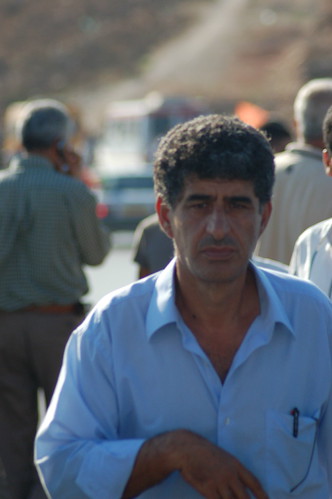
“No,” I told him, “I don’t have to.”
“Show me what you have on your camera,” he insisted.
“I don’t have to,” I told him again, “You told me to turn off the camera and I did, khalas,” I said.
“You don’t have the right to speak to me in that tone,” he replied.
This is all getting too crazy for me, now none of us have rights, and I can’t even keep track of which rights we are all losing.
I have been going to Ni’lin for two months, and as intense as things have been there I have never once, not once, been told by the Israeli Army to hand over a tape, or even turn off my camera for that matter.
True, the Israeli Army once shot Hindi’s cousin Ahmad in the hand with a rubber bullet, aimed for the video camera (which he was using at the time) but they have never come up to us and told us we don’t have the right to film.
But the PA, the PA who is supposed to be the voice of a democratic Palestine, the future of a free Palestine, wants me to hand over tapes of kids from Ni’lin sitting down in the road to protest the roadblock preventing them from burying the body of their brother, their cousin, their friend?
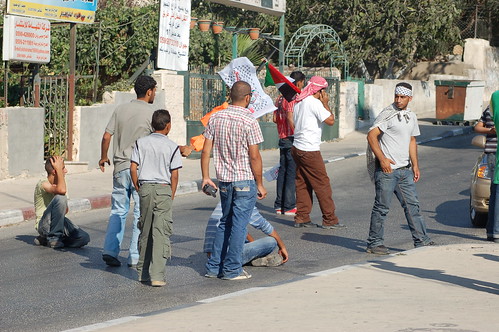
When did grief, when did loss, when did the death of two young boys become so ultimately political, and why?
Do rights politicize everything?
Why should it be this way? Why can’t it be about what it is, the simple fact of what is right and what is wrong, the loss of two young lives, the loss of two kids, two innocent, unarmed kids.
When the funeral procession was finally allowed to move, the residents of Ni’lin were determined to show the world, or at least whoever was watching, what the loss means to them.
When we reached the entrance to the village the Israeli Army was waiting, armed with live ammunition, attack dogs, and an industrial strength water canon.
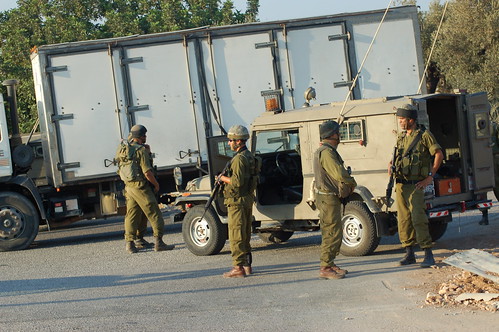
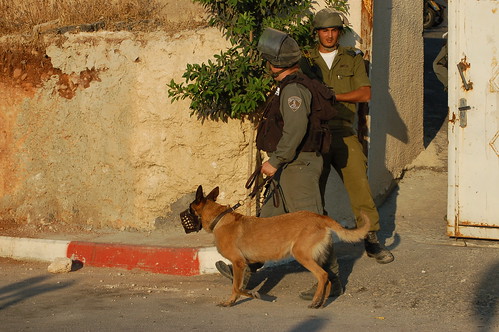
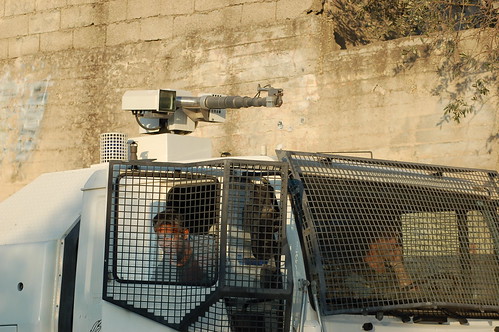
They had occupied two houses next to the village entrance, the smell of teargas was in the air.
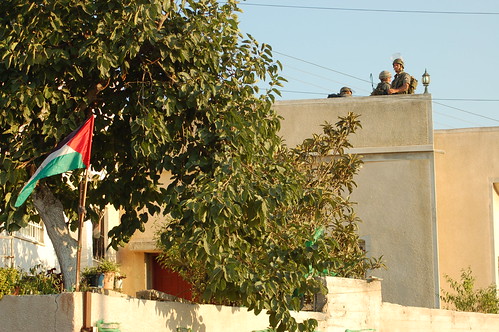
But yesterday, nobody needed any help to cry. 6,000 men, women, and children walked past the army to bury a child in the land he was born in, in the land that belongs to him, in the land of Ni’lin.
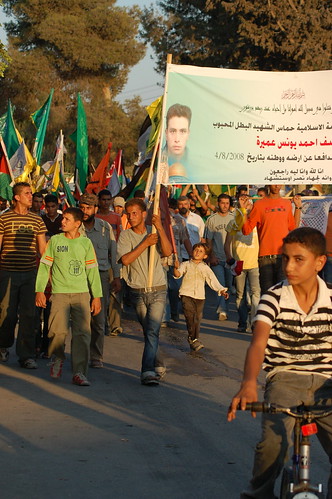
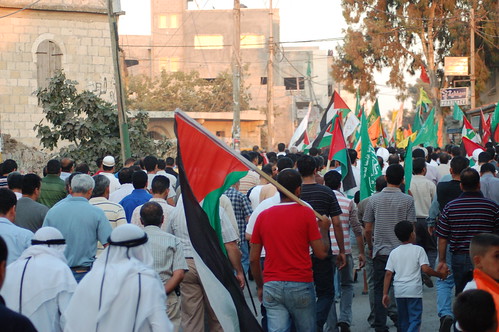
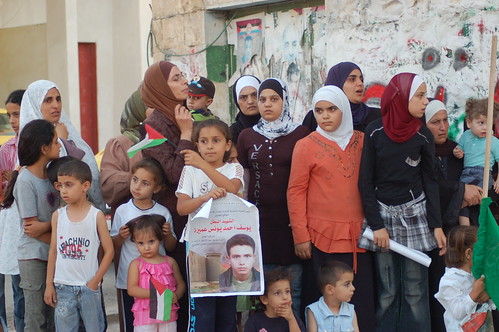
I didn’t go inside the cemetery. In so many ways it is too much for me to deal with, and like I said before when writing about Ahmad’s death, these are not my kids. Although I know Ni’lin appreciates all the international support that came to share their loss, its still their loss, and I at least can give them that right.
And so I stood outside the gate, playing with the kids, hoping that their future will include some basic rights.
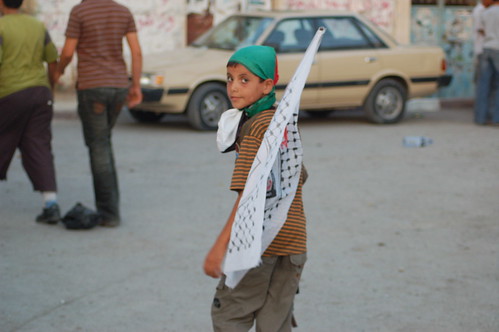
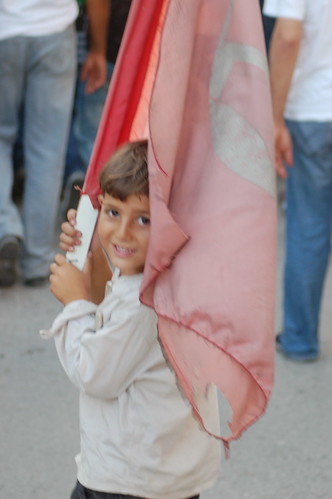
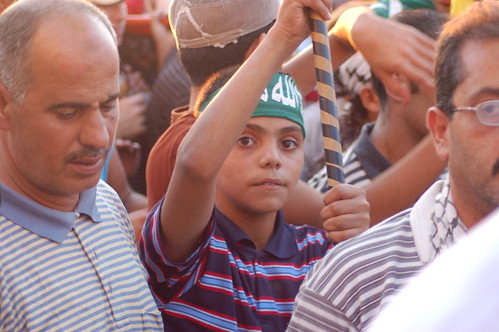
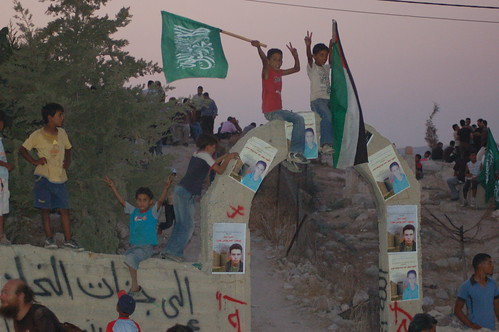
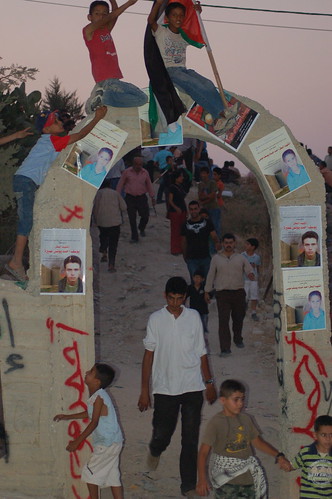
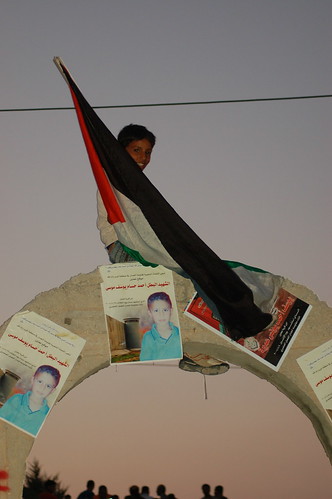
*****I just wanted to add that all of my thoughts on rights were ultimately inspired by Hindi and Viv, who gave me the following quote for an Advocacy Project press release last night: “Israel has been using excessive violence since the start of Ni’lin’s peaceful protests. Their violence has resulted in the death of 2 boys. These murders have left the village in shock and sadness, but we will not let it break us. We know we are standing up for a right cause, which is our land and our future. We are resisting one of many Israeli measures which are considered illegal under international law. Israel may have access to the use of violence, but we have the determination to stand up against their violations of basic human rights. This is what unifies the village and our peaceful struggle will not end until our rights are being met.”
You can read more interviews with Hindi by following the below links:
http://i2.democracynow.org/2008/8/1/israeli_troops_kill_two_palestinians_in
Posted By Willow Heske
Posted Aug 5th, 2014

